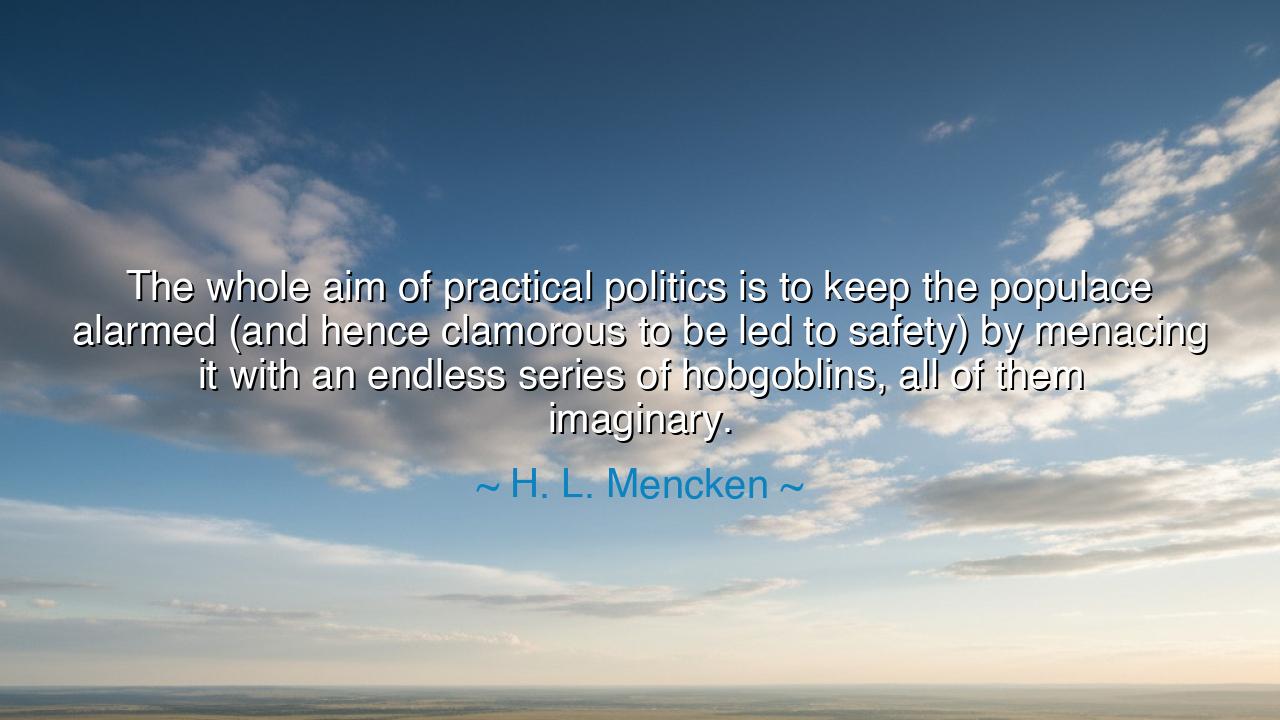
The whole aim of practical politics is to keep the populace
The whole aim of practical politics is to keep the populace alarmed (and hence clamorous to be led to safety) by menacing it with an endless series of hobgoblins, all of them imaginary.






The words of H. L. Mencken, “The whole aim of practical politics is to keep the populace alarmed (and hence clamorous to be led to safety) by menacing it with an endless series of hobgoblins, all of them imaginary,” tear away the mask of government with the sharp edge of satire. In them, he declares that fear is the most ancient tool of rulers. To keep the people obedient, one need not chain them with iron, but only with dread—dread of unseen enemies, of foreign threats, of monstrous dangers that vanish like smoke when examined in the light.
In the ancient spirit, this is the wisdom of the cynic who sees through power’s tricks. For the mob, when gripped by fear, will cry not for freedom, but for safety; not for liberty, but for protection. Mencken warns that rulers craft hobgoblins—phantoms of menace—to justify their strength and silence dissent. Thus, the people, thinking themselves defended, are in truth enslaved, for their cries for rescue become the very chains that bind them.
History offers the tale of witch trials in Europe and America. Leaders warned of witches haunting the night, poisoning crops, and conspiring with devils. The people, trembling, turned to courts and inquisitors for deliverance. Yet the hobgoblins were illusions—phantoms of fear wielded to control communities and strengthen authority. Innocents were destroyed, not because danger was real, but because fear was profitable. Here we see Mencken’s words made flesh: imaginary monsters serving the aims of power.
Another mirror is found in the age of McCarthyism. In mid-20th century America, the specter of communism was painted as lurking in every school, every office, every neighbor’s home. Lists of traitors were drawn, reputations shattered, freedoms crushed—all to defend the nation from hobgoblins exaggerated or wholly invented. The people clamored to be led to safety, and in their fear, they surrendered their liberties. The rulers, meanwhile, gained strength, proving Mencken’s cynical prophecy true.
So let this wisdom endure: beware leaders who rule by fear, for they conjure phantoms to mask their own hunger for control. The populace must not tremble at every shadow, nor surrender its freedom to those who promise safety from specters. For the greatest danger is not the hobgoblin imagined, but the slow surrender of liberty to those who profit from fear. Mencken’s words, though biting, are eternal counsel: courage is the shield of the people, and vigilance the only safeguard against the politics of illusion.






CTDoan Cao Thi
This quote captures the dark side of politics where manipulation thrives on fear. It’s unsettling to think about how often leaders exploit public anxiety to maintain control. But what’s the solution? Can we really trust politicians to stop using these tactics, or is the only way to fight back through a more transparent, accountable system? Does the power of fear ever truly dissipate in politics?
BUBao Uyen
Mencken’s perspective on politics rings true, but it also leaves me feeling frustrated. The idea that politicians may be deliberately creating fear to manipulate us is both disheartening and alarming. Are we as a public too susceptible to being swayed by these tactics? How do we break free from this cycle of alarmism, especially when it feels like the media plays such a big role in perpetuating it?
TTXuan Tran Thi
This quote feels particularly relevant today, when it seems like fear-mongering is used regularly to push political agendas. It raises an important question: how can we, as a society, push back against being manipulated by constant fear? Is it possible to build a more informed electorate that looks beyond the ‘hobgoblins’ and sees the bigger picture of what’s actually at stake?
TTDiu Hien Truong Thi
Mencken’s quote is a sharp critique of the manipulation used in politics, suggesting that leaders often create imaginary threats to control the public. It makes me wonder—how much of what we see in modern politics is really about protecting the public, versus creating fear to justify policies? How do we discern between legitimate concerns and those exaggerated by leaders for their own gain?